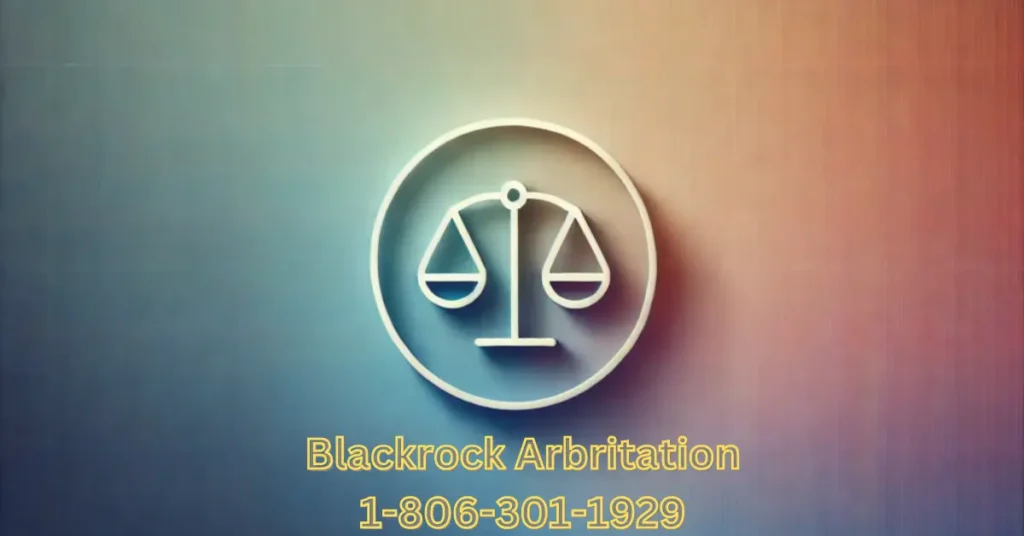Introduction
Blackrock arbritation 1-806-301-1929 When it comes to managing investments, disagreements can sometimes arise, even with major financial firms like BlackRock. For investors, navigating disputes can feel overwhelming, but that’s where arbitration comes in. Arbitration is an alternative to traditional courtroom litigation, offering a streamlined and often quicker way to resolve conflicts. For many, it’s a practical choice when facing issues like mismanagement, unsuitable advice, or miscommunication with investment firms.
We’ll walk you through the basics of BlackRock arbitration, explaining what arbitration means, how the process works, and what investors should know before starting. Whether you’re currently in a dispute or just want to be prepared, understanding BlackRock arbitration can give you the confidence to make informed decisions about your financial future.
What is Blackrock Arbritation 1-806-301-1929?
BlackRock arbitration is a process that allows investors to resolve disputes with BlackRock, one of the largest asset management firms in the world, outside of a traditional court setting. Arbitration is a form of alternative dispute resolution, where a neutral third party, known as an arbitrator, reviews both sides of the dispute and makes a binding decision. This process is often faster, more private, and less costly than a courtroom trial, making it a popular choice for investors who want efficient solutions to financial disagreements.
When disputes arise, such as issues over investment performance, mismanagement, or alleged unsuitable financial advice, investors may choose arbitration as a means to seek compensation or resolve their concerns. BlackRock’s arbitration services can often be initiated through a helpline, like 1-806-301-1929, where investors can inquire about the arbitration process, eligibility, and other related questions.
By choosing arbitration, investors can often avoid lengthy legal battles and reach a resolution in a more streamlined and cost-effective way. This approach can be beneficial for those who want to protect their investments and secure a fair outcome without the complexities of traditional litigation.
Why is Blackrock Arbritation 1-806-301-1929 Important?
BlackRock arbitration offers significant advantages for investors seeking resolution without the lengthy and costly process of going to court. Understanding why arbitration matters can help investors make informed decisions about dispute resolution options. Here are the key reasons why BlackRock arbitration is important:
1. Efficient and Faster Resolution
- Arbitration is generally quicker than traditional litigation, allowing investors to resolve disputes without waiting months or even years for court dates.
- This faster process can reduce financial strain and emotional stress, offering a timely outcome for both parties.
2. Cost-Effective Approach
- Unlike courtroom cases, arbitration often involves lower legal and administrative costs, which can be beneficial for individual investors or those with limited resources.
- Reduced costs make arbitration accessible, providing a fair chance for all investors to seek justice.
3. Privacy and Confidentiality
- Arbitration is a private process, meaning sensitive financial information and details of the dispute remain confidential.
- This level of privacy can protect investors’ reputations and personal information, as arbitration results are typically not public records.
4. Binding Decision by a Neutral Third Party
- The arbitrator, a neutral third-party expert, makes a binding decision, ensuring that both parties abide by the outcome.
- This provides investors with a sense of security, knowing the decision is fair, objective, and enforceable.
5. Specialized Expertise in Financial Disputes
- Arbitrators are often experts in finance and securities law, meaning they have a deep understanding of investment-related disputes.
- This expertise can result in a more informed and relevant outcome, as opposed to general litigation courts that may lack financial specialization.
6. Flexibility in Process and Resolution
- Arbitration allows both parties to tailor certain aspects of the process, such as setting deadlines and determining hearing locations.
- This flexibility makes it easier for investors to participate fully and comfortably, knowing that the process can adapt to their needs.
Choosing BlackRock arbitration provides investors with a pathway to resolve disputes effectively, protect their investments, and ensure fair treatment—all without the complications of traditional litigation.
Also Read: Chocolate Covered Charley Atwell
Step-by-Step Guide to Blackrock Arbritation 1-806-301-1929
If you find yourself needing to resolve a dispute with BlackRock, following these steps can help you navigate the arbitration process effectively. The helpline 1-806-301-1929 can be a valuable resource throughout this journey.
Step 1: Identify the Issue
- Clarify Your Dispute: Determine the specific nature of your complaint, whether it’s related to investment performance, mismanagement, unsuitable advice, or another issue.
- Gather Documentation: Collect all relevant documents, such as account statements, emails, and any previous communications with BlackRock.
Step 2: Contact BlackRock
- Use the Helpline: Call 1-806-301-1929 to speak with a representative about your issue. They can guide you through the arbitration process and answer any initial questions.
- Provide Details: Clearly explain your situation and provide any documentation you have prepared.
Step 3: Review Arbitration Agreement
- Check Your Agreement: Review your investment or account agreement with BlackRock to understand the arbitration clause and your rights.
- Understand Terms: Familiarize yourself with the terms of arbitration, including any deadlines for filing a claim.
Step 4: File a Request for Arbitration
- Complete the Necessary Forms: Follow the instructions provided by BlackRock or the arbitration service to complete the required forms to initiate arbitration.
- Submit Your Request: Send your completed request along with any supporting documents to the designated arbitration body, as specified in your agreement.
Step 5: Select an Arbitrator
- Choose an Arbitrator: Depending on the arbitration rules, you may have the opportunity to select an arbitrator or a panel of arbitrators. Consider their expertise and background in financial matters.
- Confirm Selection: Ensure that the chosen arbitrator is impartial and agreeable to both parties.
Step 6: Prepare for the Hearing
- Gather Evidence: Collect all evidence that supports your case, including witness statements, financial documents, and expert opinions if necessary.
- Practice Your Presentation: Organize your arguments and rehearse how you’ll present your case to the arbitrator.
Step 7: Attend the Arbitration Hearing
- Present Your Case: At the hearing, present your evidence and arguments clearly and concisely. Be prepared to answer questions from the arbitrator and respond to BlackRock’s counterarguments.
- Stay Professional: Maintain a respectful demeanor throughout the proceedings, focusing on the facts of your case.
Step 8: Await the Decision
- Receive the Award: After the hearing, the arbitrator will review the evidence and issue a decision, known as an award. This can take anywhere from a few days to several weeks.
- Understand the Outcome: Read the award carefully to understand the arbitrator’s decision and any actions required from BlackRock.
Step 9: Follow Up
- Implement the Decision: If the arbitrator rules in your favor, work with BlackRock to ensure compliance with the decision.
- Consider Further Action: If you are dissatisfied with the outcome, consult legal counsel to explore your options for appealing or pursuing further action.
By following these steps and utilizing resources like 1-806-301-1929, you can navigate the BlackRock arbitration process more effectively, increasing your chances of a favorable outcome.
Advantages and Disadvantages of BlackRock Arbitration 1-806-301-1929
Advantages of BlackRock Arbitration 1-806-301-1929
| Advantages |
| Faster Resolution Arbitration typically resolves disputes more quickly than traditional court litigation, allowing investors to get answers and resolutions in a shorter timeframe. |
| Cost-Effective The overall costs associated with arbitration can be lower than court proceedings, making it more accessible for individual investors seeking resolution. |
| Confidentiality Arbitration proceedings are private, helping protect sensitive financial information and maintaining the investor’s confidentiality. |
| Expertise of Arbitrators Arbitrators often have specialized knowledge in finance and investment, which can lead to more informed decisions compared to general court judges. |
| Binding Decisions The arbitrator’s ruling is usually final and binding, providing certainty and closure for both parties involved in the dispute. |
| Flexibility The arbitration process can be more flexible than court procedures, allowing parties to agree on certain aspects, such as scheduling and location. |
| Less Formal Environment The arbitration setting is generally less formal than a courtroom, which can reduce stress for participants and encourage open communication. |
Disadvantages of BlackRock Arbitration 1-806-301-1929
| Disadvantages |
| Limited Appeal Options Decisions made in arbitration are typically final, with very few grounds for appeal. This can be a disadvantage if a party believes the decision was unjust. |
| Potential Bias Some investors may perceive a bias in favor of the financial institution, as arbitrators may have ongoing relationships with firms like BlackRock. |
| Lack of Transparency The private nature of arbitration means that there’s less public scrutiny, which can lead to concerns about accountability for companies. |
| Limited Discovery The discovery process in arbitration is often more restricted than in litigation, potentially limiting the amount of evidence that can be gathered and presented. |
| Costs Can Still Accumulate While arbitration is generally cheaper, there are still costs involved, including fees for the arbitrator, which can add up, especially in complex cases. |
| No Jury Involvement The absence of a jury means that the decision is solely in the hands of the arbitrator, which some parties may view as a disadvantage, especially if they prefer a jury of peers. |
| Potential for Unfamiliarity Investors may be unfamiliar with the arbitration process, leading to anxiety or hesitation about participating, especially if they lack legal representation. |
The advantages and disadvantages of BlackRock arbitration can help investors make informed decisions about whether this route is the best choice for resolving their disputes.
Conclusion
BlackRock arbitration is an effective way for investors to resolve disputes without the hassle of going to court. It offers a faster, more cost-effective, and private solution while ensuring that decisions are made by knowledgeable arbitrators.
If you find yourself facing a disagreement with BlackRock, don’t hesitate to reach out at 1-806-301-1929 to learn more about the process. Understanding your options can help you protect your investments and achieve a fair outcome.
Bonus Points
Consumer Advocacy
- Many consumer advocacy groups support arbitration as a way for investors to seek justice without overwhelming legal fees or lengthy court battles.
Industry Standards
- Arbitration has become a standard practice in the financial industry, meaning many firms, not just BlackRock, offer similar options for dispute resolution.
Opportunity for Negotiation
- Before arbitration, parties often engage in settlement discussions, providing a chance to resolve issues amicably without formal proceedings.
Accessibility
- The arbitration process can be more accessible for individuals who may find traditional litigation daunting or intimidating.
Informed Arbitrators
- Arbitrators in financial disputes often have specific training and experience in finance, providing a deeper understanding of complex issues.
Potential for Collaborative Solutions
- The arbitration environment can foster more collaborative solutions compared to the adversarial nature of court trials, benefiting both parties.
Documented Precedents:
- While arbitration outcomes are typically private, some arbitration providers publish summaries of awards, creating a valuable resource for future cases.
Quick Access to Resolution:
- Investors often appreciate the ability to resolve disputes quickly, allowing them to move forward and focus on their financial goals without prolonged uncertainty.
These bonus points highlight the broader benefits and considerations surrounding BlackRock arbitration, providing a more comprehensive understanding of its advantages.





